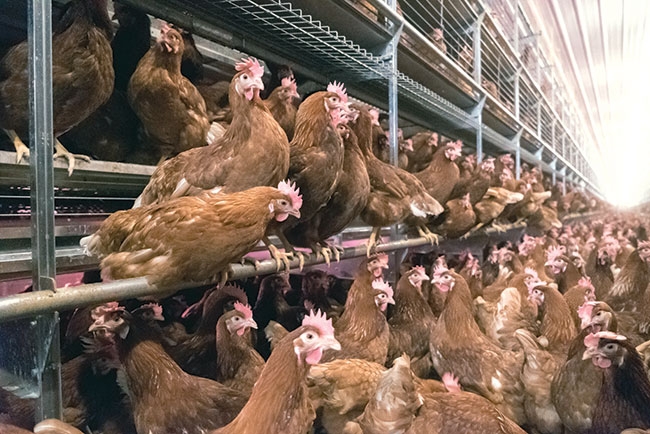
Perspectives: Animal welfare should be precompetitive
By Robin Horel
Features Business & Policy Consumer IssuesTo resist pressure from vegan activist groups, we must ensure animal welfare practices are science based, up-to-date and built through robust processes.
 Corporate animal welfare policies around issues like layer housing should be driven by evidence, not marketing strategies. Photo: BIG DUTCHMAN
Corporate animal welfare policies around issues like layer housing should be driven by evidence, not marketing strategies. Photo: BIG DUTCHMANThe Canadian poultry industry is facing pressure on animal welfare from a number of sources, including from vegan activist groups. Some of the most active have changed tactics and are pressuring our customers, retail and food service companies to adopt their demands or face significant pressure against their brands.
The poultry industry has also decided to change its response and is now publically calling out the tactics for what they are. The key to helping our customers resist activist pressure is to ensure our animal welfare practices are science based, up-to-date and built through robust processes.
We rely on the National Farm Animal Care Council (NFACC) process to update codes of practice. This made-in-Canada approach requires input and collaboration among numerous stakeholders. The result is a number of codes of practice, including the two newly updated poultry codes. I can tell you from my personal interactions that our approach is the envy of the rest of the world.
As robust a system as this is, it is not very useful until it is combined with the individual commodity on-farm animal care programs that ensure the codes are translated into practice on the farm. NFACC has a process to ensure that the on-farm programs go through the same robust process as was used in the creation of the codes themselves. It’s called the Animal Care Assessment Framework (ACAF).
All of this great work is the base but is not, in itself, enough. In my view, animal welfare in the Canadian poultry industry should be precompetitive. Members of the Canadian Poultry and Egg Processors Council (CPEPC) agree and have formally stated that animal welfare is precompetitive for our part of the industry. This means that:
- Ensuring high standards of animal welfare is a priority for the poultry and egg processing, egg grading and hatchery industry.
- Members will be open and willing to discuss research and advances in the areas of animal welfare.
- Members will share their experiences, best practices, training experience and other insights.
- Advertising should be clear and in no way misleading.
- Any claims (on label or other advertising) will not put current accepted production methods in a negative light.
- The goal of this non-competitive declaration is to raise the overall industry standards for animal welfare and increase consumer and regulator confidence in the industry.
Of note: This agreement should not interfere with any individual company’s business decisions, marketing plans or strategies.
CPEPC conducts twice-yearly animal welfare workshops. At these events, members freely share their innovations and experiences regarding animal welfare. These range from investments in technology, new processes, work with employees and farmers and more. This shows our commitment to the principle of declaring animal welfare to be precompetitive.
Canadian consumers are further away from the farm and food production than ever before. Nevertheless, they want to know “where their food comes from” and many of them are concerned with how we treat the animals in our care. That is reasonable and we should let them know about our programs and how serious we are about ensuring good animal welfare.
We are fortunate to live in a country where many of us don’t have to worry about whether food is available, safe and affordable. In addition, we are able to choose foods based on different methods of production like locally produced and sustainable.
Some of our customers may choose to market to their consumers using certain animal welfare claims. That is their prerogative and the Canadian poultry industry will endeavour to give them and our consumers all the choices they desire.
However, if we can ensure that our customers understand the good animal welfare standards that accompany all our products, this would reduce the need for competing claims, multiple programs in our plants and on our farms.
Most importantly, it would eliminate much of the confusion in the consumers’ minds about what attributes are important for them and their families.
Our goal needs to be to ensure that all Canadian produced and processed poultry and egg products are raised to a very high standard for animal welfare. Canadians should feel comfortable with whatever poultry product they choose, regardless of production method.
Robin Horel is president and CEO of the Canadian Poultry and Egg Processors Council, an Ottawa-based organization representing the interests of chicken, turkey and egg processing, egg grading and hatchery establishments.
Print this page